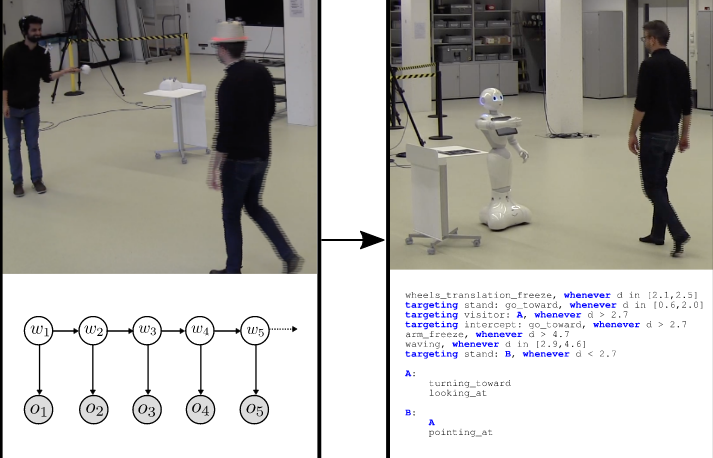
We propose a method which generates reactive robot behavior learned from human demonstration. In order to do so, we use the Playful programming language which is based on the reactive programming paradigm. This allows us to represent the learned behavior as a set of associations between sensor and motor primitives in a human readable script. Distinguishing between sensor and motor primitives introduces a supplementary level of granularity and more importantly enforces feedback, increasing adaptability and robustness. As the experimental section shows, useful behaviors may be learned from a single demonstration covering a very limited portion of the task space.
| Author(s): | Vincent Berenz and Ahmed Bjelic and Lahiru Herath and Jim Mainprice |
| Year: | 2020 |
| Month: | August |
| Bibtex Type: | Conference Paper (conference) |
| Event Name: | 29th IEEE International Conference on Robot and Human Interactive Communication (Ro-Man 2020) |
| Event Place: | Online |
| State: | Published |
| Electronic Archiving: | grant_archive |
BibTex
@conference{berenz_sensory_motor_demo,
title = {Learning Sensory-Motor Associations from Demonstration},
abstract = {We propose a method which generates reactive
robot behavior learned from human demonstration. In order
to do so, we use the Playful programming language which is
based on the reactive programming paradigm. This allows us to
represent the learned behavior as a set of associations between
sensor and motor primitives in a human readable script.
Distinguishing between sensor and motor primitives introduces
a supplementary level of granularity and more importantly
enforces feedback, increasing adaptability and robustness. As
the experimental section shows, useful behaviors may be learned
from a single demonstration covering a very limited portion of
the task space.},
month = aug,
year = {2020},
slug = {berenz_sensory_motor_demo},
author = {Berenz, Vincent and Bjelic, Ahmed and Herath, Lahiru and Mainprice, Jim},
month_numeric = {8}
}


